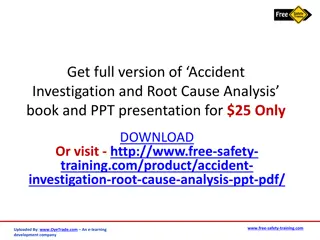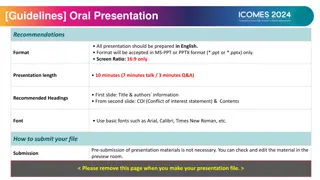
Integrative Medicine for Whole Person Wellness
Explore the integration of Eastern and Western healing approaches at the GW Center for Integrative Medicine. Discover whole person care, evaluations, defining principles, and types of integrative therapies for a holistic approach to health and wellness.
Download Presentation

Please find below an Image/Link to download the presentation.
The content on the website is provided AS IS for your information and personal use only. It may not be sold, licensed, or shared on other websites without obtaining consent from the author. If you encounter any issues during the download, it is possible that the publisher has removed the file from their server.
You are allowed to download the files provided on this website for personal or commercial use, subject to the condition that they are used lawfully. All files are the property of their respective owners.
The content on the website is provided AS IS for your information and personal use only. It may not be sold, licensed, or shared on other websites without obtaining consent from the author.
E N D
Presentation Transcript
Affiliated with the GW Center for Integrative Medicine
Four Directions Wellness Connecting Body, Mind, Emotions, Spirit Based in Del Ray, Virginia Support the Medical Model Complimentary Approaches Thirty Plus Years in Healthcare
Whole Person Care Combining Eastern & Western Healing Techniques Entirety of the Person is Evaluated Assessments and Techniques used to support Whole Person Nonpharmacological Approaches
Eastern Approaches Some examples include: India: Yoga and Chakra System China: Qigong, Tai Chi, Acupuncture, Meridians Japan: Reiki Native American: Shamanism Greeks/Romans: Meditation
Types of Evaluations Physical: Mental: Emotions: Pains, Tensions Limiting Beliefs Depression, Anxiety Passions Clean Water Spirit: Environmental:
Defining Principles The patient and practitioner are partners in the healing process. All factors that influence health, wellness and disease are taken into consideration, including body, mind, spirit and community. Providers use all healing sciences to facilitate the body s innate healing response. Effective interventions that are natural and less invasive are used whenever possible. Good medicine is based in good science. It is inquiry driven and open to new paradigms. Alongside the concept of treatment, the broader concepts of health promotion and the prevention of illness are paramount. The care is personalized to best address the individual s unique conditions, needs and circumstances. Duke University Integrative Medicine
Types of Integrative Therapies Complimentary and Alternative Medicine (CAM) Acupuncture/Chiropractic/Massage Energy Healing Therapies/Reiki Guided Imagery/Meditation Nutrition/Natural Products Qi Gong/Tai Chi/Yoga Spiritual Care Traditional Healers: Botanic, Shaman, etc. NIH-NCCAM Research 2007 Revised in 2012
Resources GW Center for Integrative Medicine http://www.gwcim.com National Institutes of Health http://www.nih.gov Academy of Integrative and Holistic Medicine https://www.aihm.org Samueli Institute https://www.samueliinstitute.org Kaiser Permanente http://www.healthjourneys.com/Store?gclid=COXey 7ma68sCFYJZhgodQhgAug
Four Directions Wellness Services Include: - Individual Sessions - Classes (Silver Card) - Employer Wellness - Consulting Services Contact Information: Mara Benner 703-776-0102 mara@fourdirectionswellness.com www.fourdirectionswellness.com






















